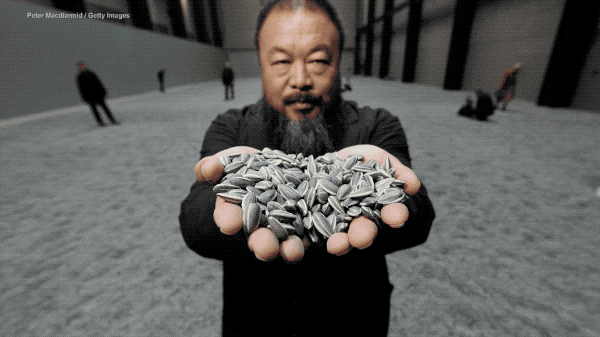Canadians held in China will feel 'forgotten,' says artist and dissident Ai Weiwei
An outspoken critic of the Chinese government, Ai was detained for 81 days in 2011

Prominent artist and dissident Ai Weiwei said two Canadians detained in Beijing may be feeling the same fear and confusion he felt himself when he spent months in a Chinese prison cell.
"It's total isolation, [and] makes you feel you are totally vulnerable, because you cannot see your lawyer or your family, and nobody knows what's going on," he told The Current's Anna Maria Tremonti.
Ai spent 81 days in detention in 2011 on accusations of tax evasion, and was released under a gag order. His supporters say his arrest was motivated by his outspoken criticism of the state, and that his later confession was procured under duress.
"The idea is to isolate you and break your nerves down, [to] make you feel nobody cares … and you are sacrificed for what you have done," he said.
"I think that's the most, worst feeling you can get, is nobody care about your condition anymore. You're being forgotten."
Michael Kovrig and Michael Spavor were detained in China on Dec. 10. Neither have been granted access to lawyers or been formally charged, receiving only monthly visits from Canadian officials.
In March, China accused the men of stealing state secrets, but it has been alleged that their detention is retaliation for Canada's arrest of Huawei executive Meng Wanzhou, for extradition to the U.S. on fraud charges.

In January, Ai said that the Chinese government's actions were "unsurprising," and accused the West of enabling human rights abuse within the country.
"The West has pretended to not notice or, more insidiously, has been a willing partner. It is the hidden force behind China's rise," he wrote in a statement, released in conjunction with his exhibit at Toronto's Gardiner Museum, which opened Feb. 28 and runs until June 9.
"The West's apparent conflict with the situation in China is because of its refusal to acknowledge its complicity in creating this monstrous regime," he wrote.
Watch Ai Weiwei describe the toll that detention can take
As China continues to grow and become more powerful, Ai said questions should be asked about what kind of society it has become, and what values it holds.
"You cannot even talk about democracy in China," he said, describing it as an "authoritarian society," with "no freedom of speech and basic human rights being violated."
He called on the Canadian government to demand that China respects the rule of law and provide "basic human treatment" for Kovrig and Spavor.
"If you don't respect that, you don't respect the whole establishment of the lawful society," he said.

New documentary looks at migrants in detention
Ai has lived in self-imposed exile for several years in Berlin, where his work has included Human Flow, a film which documented the plight of migrants trying to reach Europe across the Mediterranean.
His new documentary, The Rest, looks at what happens to those migrants once they reach Europe and find themselves detained in refugee camps, stuck in a limbo that can last for years.
The situation has worsened thanks to political inaction, he said, which in turn has led to a hardening of attitudes among local populations who see their resources and local economies under pressure from the influx.
Ai said he can't understand the hatred directed towards migrants.
"They're just like your brothers or sisters," he said.
"Anybody just look at them, they would know: 'Ok, these people need help.'"
Watch Ai Weiwei discuss what refugees face when they reach Europe
Why do some people accept oppression?
Ai said he identifies with the migrants he documents because he grew up in exile with his father, the poet Ai Qing, who was censored and banished to hard labour for almost two decades.
Understanding why some people speak out against oppressive regimes, and others accept them, is "a really hard question," he said.
"It's even a question I would ask myself every day: why … over 1.3 billion, 1.4 billion people are not really responding or reacting to this clearly unhealthy [society] or injustice."

He suggested it may be the result of decades of governance where anyone who questioned the status quo was punished, while those who fell in line were rewarded.
"There's almost no ground for anybody to raise a question," he said.
Given the right circumstances however, Ai believes that all societies could fall subject to suspicion and state control. He pointed to the example of McCarthyism in the U.S. in the 1940s and 1950s, where people accused each other of holding communist beliefs.
He said the West behaves as if its freedom and democracy are set in stone, a viewpoint he called an "illusion."
"That takes every generation, every day, to demand to protect those values," he said.
"Otherwise it simply will be taken away from us."
The Rest airs at the Hot Docs film festival in Toronto on April 27 and May 5.
Click 'listen' near the top of this page to hear the full conversation.
Written by Padraig Moran. Produced by Julie Crysler.

